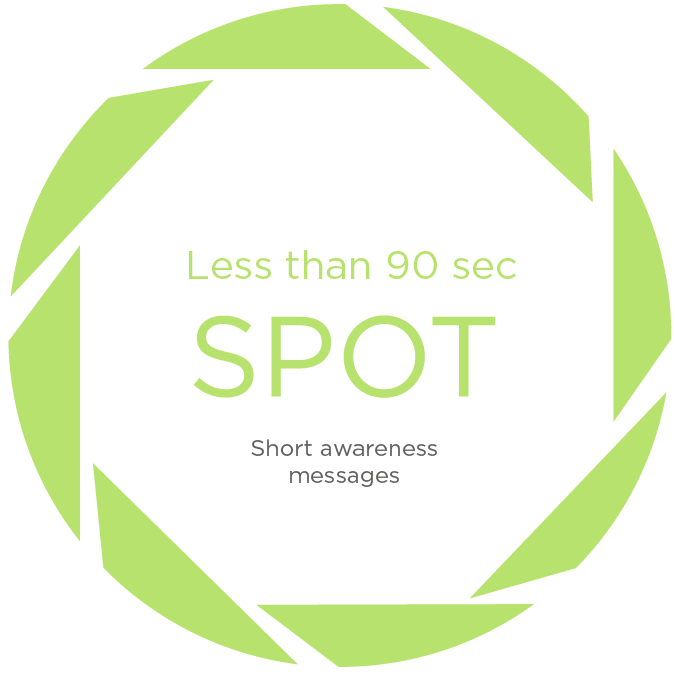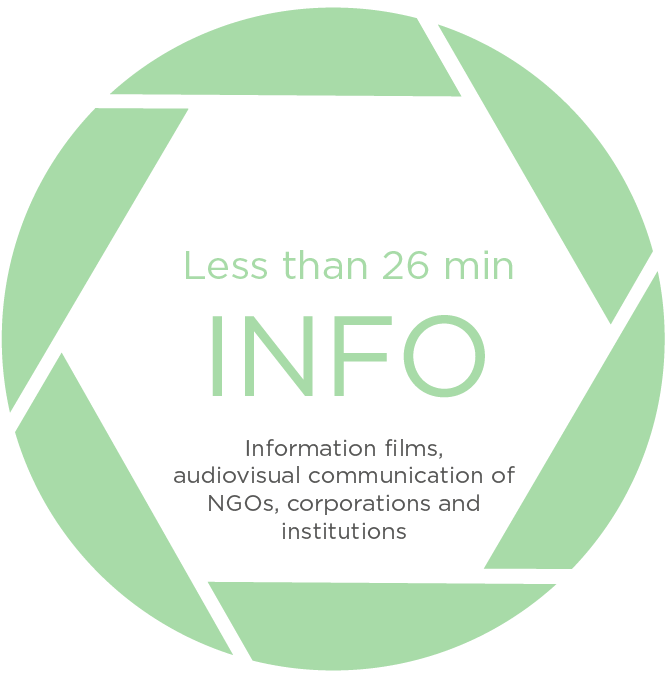3 competitions
Films can be registered in one or more categories from the following three competitions.
15 categories
The Great Environmental Challenges
1 - Fight and Adaptation to Climate Change
The challenge of adaptation to natural risks and the fight against the impact of climate change
Global warming, the rise of the oceans, floods, forest fires and desertification: the long- lasting modification of the global climate, due to natural phenomenons or resulting from human activities, requires the reduction of our use of fossil energy, as well as the improvement of the energetic performances and the production of renewable energies. This means taking individual and collective measures by organisations, public administrations, corporations, and everyone; as such, it will offer opportunities for economic, social and environmental innovations.
2 - Preservation of the Biodiversity
The preservation of fauna, flora and the natural environments
The preservation of natural areas and their resources is a necessity. Furthermore, the connection to biodiversity is a source of education for the respect of nature and its beauty, its richness being a source of awakening and inspiration. The continued existence of this natural inheritance must be safeguarded for the survival of fauna and flora, their reproduction and development and the protection of their natural grounds, which is the only way of favoring the diversity of the ecosystems.
3 - Seas, oceans, and water environments
The protection of the biological equilibriums of the seas, oceans, corals, and the aquatic natural spaces of the lakes and rivers
For centuries, humanity acted as if seas and oceans, the actual lungs of the earth, as well as lakes and rivers, were infinite resources capable of feeding us and absorbing all our wastes. Against the inexorable extinction of our coral reefs, of our mangroves, the drying up of our swamps and wetlands, the threat on areas of reproduction for fishes, the melting of the ice caps, most aquatic areas are in danger, as well as the eco-systemic resources, fisheries and even hunting in the Great North. The list of the threats weighting on our natural aquatic areas is endless : waste waters, pesticides, oil pollution, plastics and even aquaculture. We need to ensure a sustainable production of fish and a resilience of the maritime ecosystems while insuring the preservation of biodiversity.
The Fields of Ecological Application
4 - The energy transition
Solar, wind, geothermal, marine and biomass energy as well as the control of the energy consumption
Research, development, undertakings and projects are multiplying in the field of renewable energies, new technologies are being implemented by corporations and public administrations. These actions for a sustainable development will spare natural resources and provide a better energetic efficiency.
6 - Housing, territories and living environment
As a great consumer of resources, energies and a source of artificialization of the soils and of greenhouse gas emissions, our housing has a strong impact on the climate and biosphere.
To conceive, develop and maintain a “sustainable city”, is a fertile ground for environmental, cultural, social and economic innovations, thanks to adequate infrastructures and strategies, a network of associations, incubators, fablabs and “third-places”. Shared mobility, rewilding the territory, a housing of high environmental quality, low consumption yet accessible for all, are the conditions of a greater quality of life, as a growing part of the population imagines its life in locations in harmony with nature : new rurals, communities, eco-places and other alternative lifestyles.
8 - Eco-tourism and Responsible Travel
Sustainable Tourism on Land and Water, in Cities and the Countryside
The eco-tourist is a responsible traveller who consciously works to limit his or her impact on the environment: he travels in natural environments where resources and populations are respected. The lone traveller discovers landscapes and eco-systems, creates exchanges with the populations he meets, safeguards the sites. Slow tourism, eco-tourism on rivers or in forests, even rural or urban, is the opposite of mass-tourism.
5 - Agriculture and sustainable resources: soils, seas and forests
Responsible agriculture, soil and forest management and resources, the fight against deforestation
Sustainable agriculture, permaculture, biodynamic, agroecology, sustainable breeding : the management of resources aims at preserving the soils and reduce waste products while allowing for the perpetuation of species on a long term basis. The protection and management of forests and wood resources help to develop economic, environmental and social goals that increase their resilience.
7 – Means of transportation et eco-mobility
Urban and public transports, transports by rail, on rivers, in the air and inter-modality
Eco-mobility by less- polluting transports, with a lower impact on the environment and health : car-sharing or hybrid/electric/hydrogen cars and buses, piggybacking or waterway transports, trams or bikes in the city, cyclo-tourism or hiking tours and inter-modality, combining several transportation means, and technologies to optimize the use of infrastructures.
9 - Sustainable Production and the Circular Economy
Recycle, Reuse, and Reduce our Ecological Footprint in Sustainable Development
Modern methods of production have lead to a growing exploitation of natural resources that affect both the climate and biological diversity. To build a new model of development implies discovering energy-saving production methods that could create potential new economic activity and jobs through the treatment of water and waste, reuse of raw materials, or recycling electronic waste. This also involves the revaluation of manual work or craftsmanship: quality rather than quantity, local, ethical and sustainable raw materials, better traceability of products, transparency, suppliers paid fairly, rediscovery of ancestral know-how...
10 - Responsible Consumption and Eco-labels
Eco-labelled products, Fair trade, Collective Consumption
To engage in responsible consumption as a consumer means being aware of geographic origin, buying regionally or locally, favouring a label respectful of the environment, promoting fair trade, reducing use of packaging, fighting against over-consumption, using selective waste-sorting, and giving preference to usage over ownership.
Societal Issues
11 - Quality of Life
Quality of life through the protection of the environment, health safety and prevention, treatment and quality of water, air and soil, waste management
Urban living, sound pollution, electronic or toxic, junk food, stress … It is obvious that our lifestyles must evolve to protect our health and our wellbeing by choosing a healthy nutrition (vegan, vegetarian, flexitarian, organic…), remembering the importance of social links and intergenerational transmission, of traditional and alternative medicines, respecting ancestral customs. To cultivate one’s inner life means to reconnect with oneself and nature, to understand the links between environmental, animal and human health as revealed by the recent pandemic. Culture must reconnect with nature and the search for equilibrium and harmony must become the heart of our priorities.
13 – Humanitarian action and solidarity
Solidarity and actions against exclusion, illiteracy, poverty or disability, for food and energy security.
Solidarity and humanitarian assistance means to relieve human beings that suffer hunger or cold, are disabled or illiterate, are refugees or of racial or cultural diversity. These social actions for education, culture, health-care, access to energy, food and clean water , try to relieve victims of natural or , increasingly, man-made disasters.
15 - Innovations and Technological Leaps
The 4th technological revolution for the 3rd millennium
The new technological revolution aims at a sustainable future with a diminished footprint on the environment: bio-sourced resins, eco-materials, biometric ergonomics, nanotechnologies, low-tech etc. These technologies offer new solutions to environmental and societal issues.
12 - Organisations and Social Responsibility
The responsibility of corporations, individuals and organisations as to their effect on society
The social and environmental commitment of a corporation (CSR) means that corporate leadership integrates environmental concerns (climate, biodiversity, pollution etc.) but also social concerns in their activities and investments: well-being at work, in-house training, equal opportunities, occupational health, environmental care, respect for the public.
14 – Human Rights
Protection of women, children and elderlies, respect of diversity, LGBTs, rights of disabled or migrant people
What are human rights about? The protection of children and women of all types of violence, the acceptance of others and their differences, the awareness of non-violence and equality of rights for every human being and, notably, access to work and a decent living, and ,finally, dignity in old age and the end of life. For political refugees, economic and climatic migrants, for displaced farmers, a real policy of integration is required. Human rights include the respect of diversities, including cultural, racial, social, religious, sexual and gender diversity. Those are natural rights, imprescriptible, inalienable and inherent to the person.


















